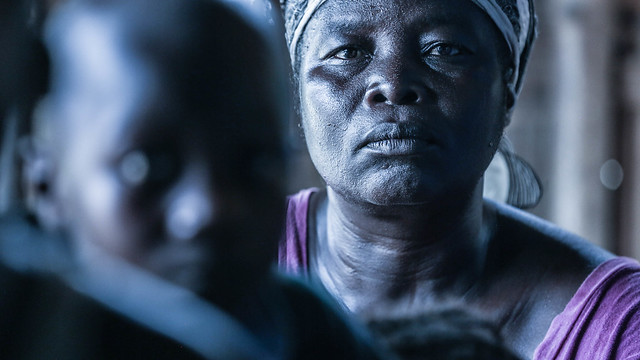Four Foreign Based Libya Terrorist Groups
Foreign Terrorist Organization is a designation for non-United States-based organizations deemed by the United States Secretary of State, in accordance with section 219 of the Immigration and Nationality Act of 1965, to be involved in what US authorities define as terrorist activities.
Libya has a population of 6.9 million with over 90 percent of the population living along the Mediterranean coast, the capital Tripoli to the west and Misratah and Benghazi.
Around 91 percent of the country is desert or semi desert due to the Sahara desert. Due to the vastness of the Sahara desert and the fact that only 9 percent of the land in Libya is arable meaning the land is capable of being ploughed and used for farming crops.
Libya's concentrated population and its proximity to southern Europe and the
Mediterranean Sea makes it attractive to terrorists and fuel animosity toward Sub-Saharan African migrants.
 |
| Unrelenting fighting in Libya has devastated towns and villages |
Four Foreign Based Libya Terrorist Groups
The US State Department declared four foreign based Libya terrorist groups Al-Mulathamun Battalion, Al-Qa’ida (AQ), Al-Qaida in the Islamic Maghreb (AQIM), and Islamic State of Iraq and the Levant (ISIL).
Explanation of four foreign based Libya terrorist groups.
Al-Mulathamun Battalion.
Originally, part of al-Qa’ida in the Islamic Maghreb (AQIM), the al-Mulathamun Battalion became a separate organization in late 2012 after its leader, Mokhtar Belmokhtar, split from AQIM.
al-Mulathamun Battalion also known as the Masked Battalion aims are to replace regional governments, including Libya's transitional government, with an Islamic state.
In May 2013, the al-Mulathamun Battalion cooperated with the E.O. 13224-designated Movement for Unity and Jihad in West Africa (MUJAO) in twin suicide bombings in Niger, which killed at least 20 people. In August 2013, the al-Mulathamun Battalion and MUJAO announced that the two organizations would merge under the name “al-Murabitoun.”
The newly formed al-Murabitoun extremist group constitutes the greatest near-term threat to U.S. and Western interests in the Sahel. Both the “Those Who Sign in Blood” battalion and “al-Murabitoun” are included in the designation as aliases of the al-Mulathamun Battalion; they maintain an operational presence and engage heavily in kidnappings for ransom.
Al-Qa’ida (AQ).
Al-Qaeda means The Base in Arabic and is broad-based militant Islamist organization founded by Osama bin Laden in 1989.
The oldest of the Islamist militant groups operating in North Africa, Al-Qaeda in the Islamic Maghreb (AQIM) came into being in 2005 when it changed its name from the Algerian Salafi Group for Call and Combat (GSPC) and announced its allegiance to Osama Bin Laden.
In February 2017, 15 people were killed and 19 injured in Tiloa, Niger in an ambush attack by Al-Qaeda militants.
Al-Qaeda was declared terrorist group by US on October 8, 1999. Al-Qaeda aims to bolster networks in Libya and, ultimately, establish a pan-Islamic caliphate under a strict Salafi Muslim interpretation of Sharia and maintains a growing presence operating training camps and safe havens stages attacks in Libya against Egypt and Tunisia.
Al-Qaida in the Islamic Maghreb (AQIM).
al-Qaida in the Islamic Maghreb (AQIM), which emerged in 2007 after the Salafist Group for Preaching and Combat allied itself with al-Qaida in 2006.
Kidnapping for ransom by taking European hostages has become a key funding source for terrorist groups operating in the southern portion of the country. Designations of Mohamed Belkalem and Taleb Nail are in direct response to the threats posed by al-Qa’ida in the Islamic Maghreb and its senior leaders.
Mohamed Belkalem has played a key operational role in AQIM. He has participated in terrorist attacks such as the 2005 assault on Mauritanian military barracks and, separately, the kidnapping of two Austrian tourists in 2008.
Belkalem is wanted by the Algerian government. He was also charged with and sentenced by the Government of Algeria, in absentia, to death for forming a terrorist organization.
Taleb Nail has been involved in numerous terrorist attacks in the Maghreb including a 2005 assault on Mauritanian military barracks. In 2005, Nail joined a terrorist cell specifically dedicated to kidnapping western nationals, preparing and carrying out attacks, and recruiting violent extremists.
Nail is wanted by the Algerian government for terrorist activities and for membership in a terrorist organization active both within and outside Algeria. al-Qaida aims to replace Libya's transitional government with Sharia and, ultimately, establish a regional Islamic caliphate across all of North and West Africa. Area of operation is primarily in the western and southern regions; centered mostly on kidnappings for ransom.
Islamic State of Iraq and the Levant (ISIL).
May 2016, the Department of State has announced the designation of the Islamic State of Iraq and the Levant’s (ISIL’s) branch in Libya (ISIL-Libya) as a Foreign Terrorist Organization under section 219 of the Immigration and Nationality Act (INA).
ISIL-Libya’s attacks have included the kidnapping and execution of 21 Egyptian Coptic Christians, as well as numerous attacks targeting both government and civilian targets that have killed scores of people.
Their aim is to strengthen its affiliate ISIL-Libya and enhance operational planning and logistics networks for staging attacks inside Tunisia. ISIL-Libya stages attacks in Libya against Tunisia along the Libya-Tunisia border; collaborates with its affiliate ISIL-Libya


























